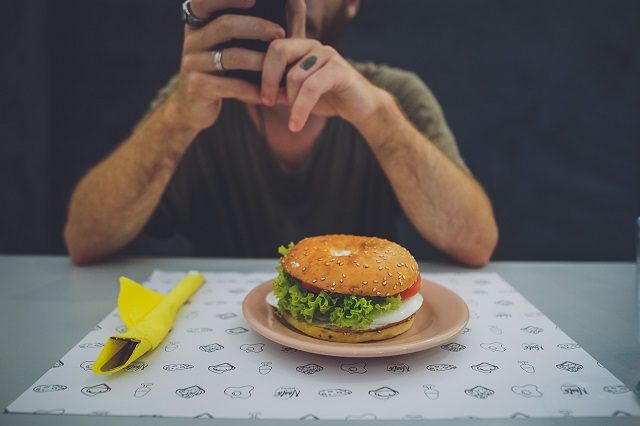For most people, eating is a side-task.
It’s something they do on the fly or while multitasking so that they save time or are more productive.
However, surprising new insights from studies have shown that eating distracted, under stress, or in a hurry can have a profound impact on our body’s ability to absorb and assimilate nutrients. It also makes us feel hungry sooner than usual, which explains some forms of overeating.
Ever catch yourself drooling over some food just by thinking about it? Yep, most of us have been there. Used either literally or metaphorically, the concept behind the phrase, “I am drooling” is deeply ingrained to our biology. So much so, that learning how to interpret and utilize this in our everyday lives could change our attitude toward food and our process of eating.
What we are talking about is something known to the scientific community as “Cephalic Phase of Digestion Response.” I know, you’ve never heard of it. It’s mostly unknown to the general public.
Digestion starts before we start eating.
Let’s see what “Cephalic Phase of Digestion Response” means and how it affects us.
In the old days, we believed that food digestion started as soon as food reached the stomach. Later, we found that there are glands in our mouth, which secrete enzymes that initiate the breaking down of carbohydrates—the simplest of all carbohydrates, table sugar, is completely broken down inside our mouth and absorbed directly by the body. But for some time now, we also know that the digestion process begins even before any food comes into our mouths.
When the image of food that we are about to eat forms in our mind, the brain gives the body the command to start preparing for the digestion process. In other words, the brain processes and senses the image and smell of the food instructing our bodies to start producing the appropriate gastric fluids and enzymes. One of these preparatory actions is indeed to activate the salivary glands, so we start to drool.
During the cephalic phase, between 20 percent and 40 percent of the total enzymes and digestive fluids that will be required for the complete digestion process are secreted. Take a moment to ponder that percentage. That’s huge! In a sense, almost half of the digestion process is done before we even start eating.
In addition, while we eat, the brain analyzes the color, appearance, texture, and flavor of the food. It even sends messages to the Enteric Nervous System (ENS) about the ingredients being digested: Have we had enough fat, carbohydrates, protein, water, and micro-nutrients? Do we need more digestive enzymes? Do we need to make the stomach more acidic or less acidic?
If it does not feel good, you’re doing it wrong.
And now, it’s time for something magical. The Cephalic Phase takes place only when we eat food that we enjoy! More specifically, how well we metabolize the food we eat is directly dependent on the pleasure and enjoyment that we get from eating that food. When we eat something we do not like, a mild (or not so mild) stress response is activated, which makes the digestive system slow down or stop working.
There’s research on the subject dating back to the 2000s.
Parents beware.
Those among the readers who are parents, please take a moment to go over what we’ve just said one more time, before going any further…
Read it?
Okay. Now, are you familiar with table conversations that go like, “You will eat it because it’s good for you,” “No, I do not like it,” “You’re not getting up from the table until you finish your dish,” or “I don’t want to; I’m not going to eat it?”
Well, let me break some news. For someone who is eating under stress (and being forced to eat something they don’t like does create stress), their digestive system shuts down and stops absorbing nutrients, almost entirely. It’s a perfectly normal side-effect of the fight or flight stress response. Even if it is a super-duper superfood, it makes no difference. If stressed, the human body will barely absorb any of its nutrients. A superfood eaten under stress becomes equivalent to junk—little more than empty calories.
It would be much more pleasant and beneficial to be playful with food—to try alternatives, different foods with the same basic nutrients, or the same foods, but cooked differently. Our goal must be to cultivate (within ourselves and in those around us) the natural instinct to recognize what the body needs and how to experience the joy of eating.
Overeating or is it this?
And that brings us to another hugely important issue: being present during our meals.
This means that while we eat we must be consciously present with our food—all of our physical senses involved in eating active in the process. We see the food. We smell the food. We taste the food. We touch the food. This state of experiencing food has been called many names, including “mindful eating.” By being present and focused on our senses (and not on our thoughts), we help our body enjoy the food and absorb the maximum amount of nutrients.
When we are not consciously present during our meal, this means that we will miss the cephalic phase of digestion. The brain is focused on something else rather than the food and task at hand. In turn, this means that the corresponding gastric fluids and enzymes will not be excreted, which in turn means that a corresponding percentage of nutrients will not be absorbed.
After a while, the brain will catch up with our lack of nutrient absorption: “Wait a minute, where are my nutrients, carbs, fats, proteins, trace elements, and vitamins?” To correct this situation, the brain will make us feel hungry again, so that we eat and get the nutrients that we supposedly missed. It does this regardless of the calories we have already absorbed.
If you sometimes find that you get hungry again very quickly, take a moment to step back and think: How did you eat your last meal? Quickly, distracted, multitasking, detached from your physical senses with your mind full of thoughts that have nothing to do with your meal? You may think that you were being productive and efficient, but your body thinks otherwise. And the body’s survival mechanisms always win.
Next time you eat, focus on eating and enjoying the food with all your senses. Sit down at the table. Breath. Take a moment to observe the food. Smell the food.
Explore the flavors in your mouth. Experiment. Try feeling your senses instead of thinking, and try this:
- Create a relaxing atmosphere
- Turn off the TV
- Turn off the computer.
- Put your phone in silent mode and leave it aside.
- Give yourself a few seconds to take in the looks and the aroma of the food.
- Breathe before you start eating. Practice taking twice as long to exhale and inhale. Do this four to five times.
- Slow down. Even if you only have five minutes to eat, make it a slowed-down and relaxed five minutes.
- Eat slowly. Chew slowly. Put the fork down after each bite.
- Enjoy the flavors.
- Practice putting thoughts aside; let them pass. “Not now, I’m enjoying my meal. Back to eating.”
- Observe and feel; don’t use your head, use your senses. Is it sweet, sour, bitter, salty, does it have a delicious taste?
- Put all your senses into the game. The food has a look, smell, taste, texture, touch, sound! (yes, there are sounds when we eat; observe them too!)
Feel the difference?
~












Read 1 comment and reply